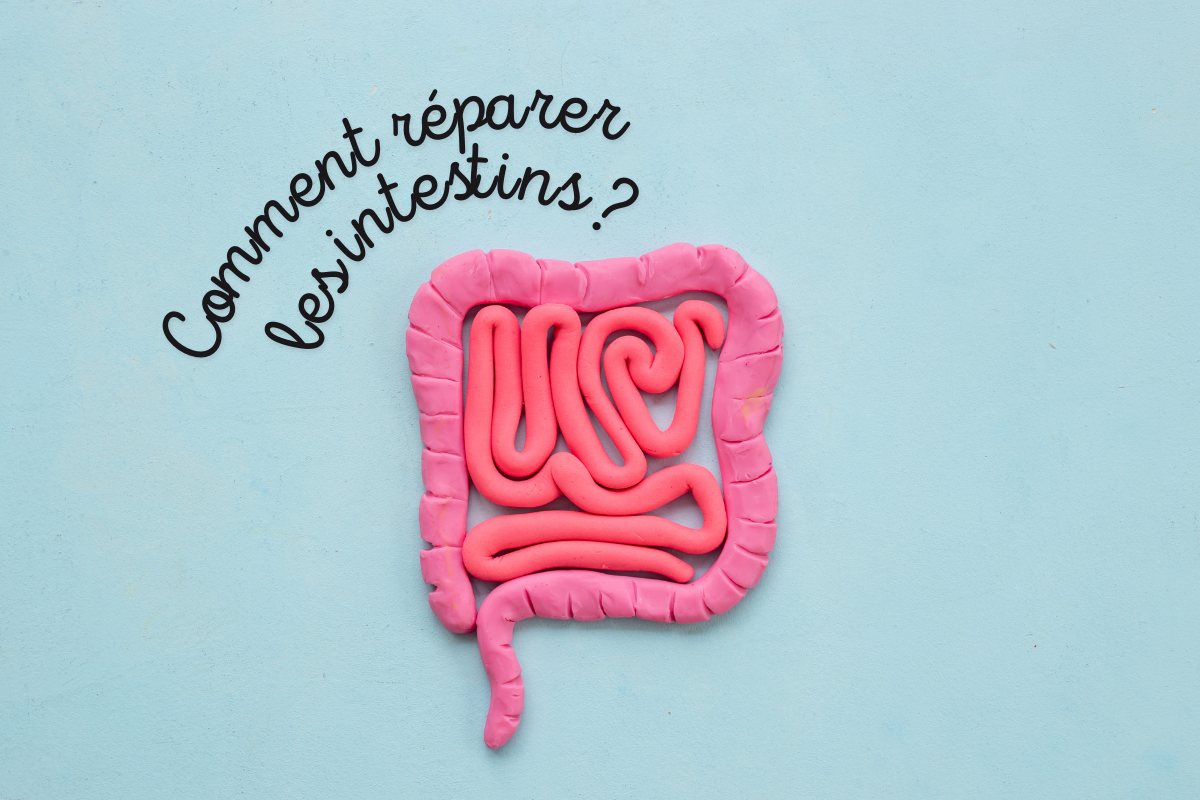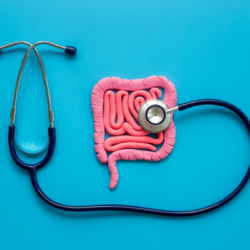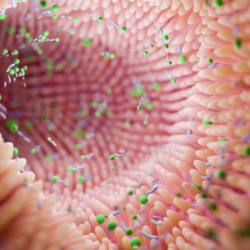Understanding the causes and mechanisms of intestinal permeability is essential, but it’s not enough: you also need to know how to take action to restore an effective digestive barrier. In this second part, we explore the natural levers for repairing the intestines, in particular through diet, supplements and lifestyle changes.
What diet promotes intestinal repair?
The repair of the intestinal barrier can be significantly influenced by diet. One study highlights the impact of diet on the gastrointestinal microbiota, particularly in terms of preventing dysbiosis, an imbalance in the microbiota that can lead to inflammatory bowel diseases such as ulcerative colitis and Crohn’s disease. It has been established that the Western diet, high in fat and low in fibre, promotes severe dysbiosis. Conversely, Mediterranean and vegetarian diets, rich in fruit, vegetables, olive oil and oily fish, have anti-inflammatory effects and could prevent dysbiosis and associated inflammatory bowel disease. (9)
With regard to supplements and natural remedies, one study has shown that nicotinamide riboside (NR), an NAD booster, can reduce ethanol-induced damage to the intestinal barrier. Ethanol increases intestinal permeability and damages the structure of the intestinal epithelial barrier. NR has been shown to have protective effects on epithelial tight junctions, which are essential for the integrity of the intestinal barrier. It promotes the maintenance of NAD homeostasis and mitochondrial function, thus playing a crucial role in protecting the intestinal barrier. (10)
Which food supplements can strengthen the barrier?
Repair of the intestinal barrier can be approached naturally through nutritional approaches, supplements to repair the intestinal mucosa and natural remedies. Below is a selection of effective supplements for managing intestinal barrier problems, based on products available in our online organic pharmacy.
| Product | Description |
|---|---|
| Aboca Colilen capsules | Formulated for irritable bowel syndrome. Contains peppermint essential oil and caraway essential oil. |
| Vitall Butyragen vegetarian capsules | A tributyrin complex to support intestinal health. |
| Biocyte Colon Restor-CI capsules | A dietary supplement for intestinal comfort, containing chamomile and lemon balm extracts. |
| L-Glutamine sachets | An important amino acid for intestinal health. Available in sachets. |
These products are designed to support intestinal health, but it is important to consult a healthcare professional before using them, especially if you have underlying medical conditions.
Why is glutamine essential for gut health?
Glutamine, a key amino acid in intestinal health, has been the subject of numerous scientific studies highlighting its essential role in repairing and maintaining the intestinal barrier
- Improving intestinal permeability with glutamine: Several studies have shown that glutamine supplementation can protect the intestine against the harmful effects of stress and reduce intestinal permeability. Glutamine has also been shown to be effective in preventing damage to the intestinal mucosa caused by indomethacin, a drug that increases intestinal permeability. “In addition, it was found to be able to prevent the dysfunction of the intestinal barrier caused by the administration of corticosterone in rats.
- Repair of damaged mucosa and maintenance of intestinal balance: Glutamine helps to strengthen the tight junctions between intestinal epithelial cells, thereby helping to maintain the integrity of the intestinal barrier. It has also been shown to improve the barrier function of human enterocytes and prevent atrophy and dysfunction of the intestinal barrier by increasing the expression of the Hsp70 protein in intestinal epithelial cells.
How do stress and physical activity influence the intestine?
Stress management and physical exercise also play an essential role in intestinal health. Stress, perceived as an acute threat to homeostasis, affects the functions of the gastrointestinal tract in the short and long term. It alters gut-brain communication, leading to the development of a variety of gastrointestinal disorders. These effects include altered gastrointestinal motility, increased visceral perception, changes in gastrointestinal secretion, increased intestinal permeability, negative effects on the regenerative capacity of the gastrointestinal mucosa and on the intestinal microbiota. At the same time, physical exercise has been shown to independently modify the composition and functional capacity of the intestinal microbiota, underlining its importance in maintaining intestinal health. (11)
These combined approaches, combining an adapted diet, targeted supplements and the management of stress and exercise, offer a holistic strategy for repairing and maintaining the health of the intestinal barrier.
Which foods promote a healthy intestinal barrier?
In order to support intestinal repair and the maintenance of a healthy mucosa, it is essential to pay attention to our diet. Certain specific foods play a key role in this process. Here is a summary table of foods beneficial to intestinal health, based on recent reliable research. In addition to their nutritional value, these foods offer unique properties to promote optimal intestinal function(12)
| Food | Properties and Benefits |
|---|---|
| Sauerkraut (or fermented cabbage) | Rich in vitamin C, potassium, phosphorus and calcium. Promotes the mobilisation of bacteria essential for the intestine thanks to lacto-fermentation. |
| Honey | Contains fructo-oligosaccharides, which act as a prebiotic to stimulate the growth of bacteria favourable to the intestine. Antioxidant. |
| Miso | Source of zinc and iron. Fermented paste beneficial for digestion and the intestinal tract. |
| Natural yoghurts and probiotics | Rich in calcium, vitamin D and phosphorus. Contains acid-lactic bacteria that help restore intestinal balance. |
| Vegetables and certain fruits | Source of essential dietary fibre, particularly galacto-oligosaccharides and fructo-oligosaccharides. Examples: onion, banana, asparagus, leek, artichoke, chicory. |
| Fibre-rich foods | Vegetables, fruit, wholegrain cereals, pulses. Fibre promotes healing of the intestinal mucosa. |
| Foods rich in omega-3 fatty acids | Oily fish, walnuts, flaxseed. Beneficial for intestinal health. |
| Anti-inflammatory foods | Berries, cruciferous vegetables, avocados, walnuts, linseed. Rich in antioxidants and omega-3s, they reduce inflammation and promote intestinal healing. |
| Fermented foods | Kefir, sauerkraut, kimchi, yoghurt. Contain live cultures and certain probiotics that improve the diversity of the intestinal microbiota. |
| Prebiotics | Dietary fibres in vegetables and fruit that nourish and stimulate the growth of beneficial bacteria, strengthening the intestinal barrier. |
Why is dietary diversity essential?
Adopting a diverse diet is fundamental to enriching the diversity of the intestinal microbiota, which plays a crucial role in protecting and maintaining the health of the intestinal mucosa.
Dietary diversity plays a crucial role in the health of the intestinal microbiota. According to research, including the study“Influence of Foods and Nutrition on the Gut Microbiome and Implications for Intestinal Health” (PMID: 36076980), food components provide substrates for the mutualistic microbial flora in our gastrointestinal tract, modulating its structure, composition and function. This interaction between the microbiota and the intestinal epithelium is vital for maintaining intestinal homeostasis in a healthy state.
Dr Will Bulsiewicz, a renowned gastroenterologist, also stresses the importance of diversity in our diet. Each microorganism in our intestine fulfils a different function and offers unique benefits. The more diverse our intestinal microbiota is in terms of species, the better our body functions and the healthier we stay. Reduced diversity, often caused by factors such as antibiotics and stress, can diminish this capacity.
Dietary fibre is essential for nourishing the microbiota and maintaining its health. They produce compounds called short-chain fatty acids, which are beneficial to health and increase the diversity of the intestinal microbiota. A high fibre intake therefore promotes a diverse and functional microbiota.
Why is the Netflix documentary relevant?
The documentary “Bien dans son assiette, la preuve par 2”, also known as“You Are What You Eat: A Twin Experiment“, offers a fascinating exploration of the impact of diet on the human body. This Netflix documentary series features identical twins who change their diet and lifestyle for eight weeks as part of a scientific experiment. The study, inspired by research at Stanford University, aims to observe the effects of two distinct diets – a vegan diet and an omnivorous diet– on these genetically identical twins.
This documentary is also particularly relevant to our article on intestinal permeability and repair. It highlights the importance of food choices in gut health. The documentary reveals how different diets influence physical, mental and gut health in genetically identical twins. This nutritional focus completes our section on dietary approaches to repairing the permeability of the intestinal barrier.
The documentary, directed by Louie Psihoyos, does not confine itself to nutritional aspects. It also establishes a link between eating habits and climate change, highlighting the interconnection between personal health and the health of the planet. This broader perspective is in keeping with the notion of global well-being discussed in our article, which encompasses not only gut health but also the environmental and social impact of our food choices.





